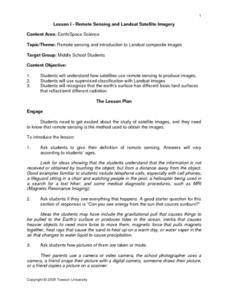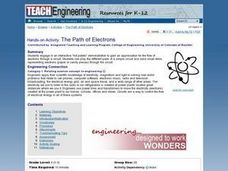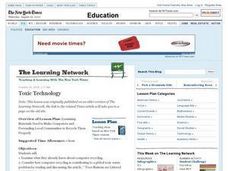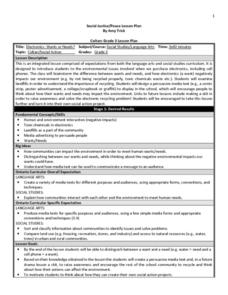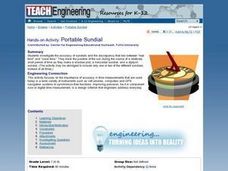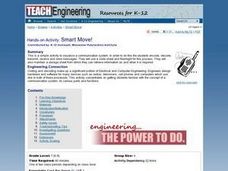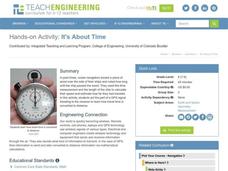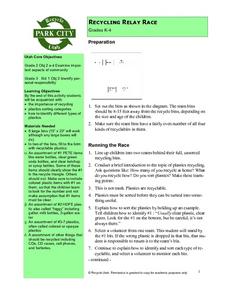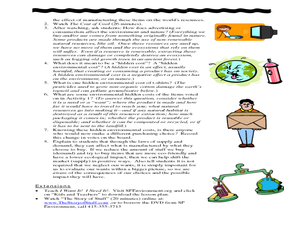Curated OER
Robot Earth
Students construct a simple robotic energy transformer. In this space science instructional activity, students explain how energy is transformed from one form to another. They identify the different uses of robotic devices.
Curated OER
Student Tracking
Here is an interesting activity on satellite tracking. Learners use various tracking techniques to find out where they go on a daily basis, what the environmental conditions are, and what they are doing during their "migrations." A...
Curated OER
Remote Sensing and Landsat Satellite Imagery
Learners comprehend how satellites use remote sensing to produce images. They use supervised classification with Landsat images. Students recognize that the earth's surface has different basic land surfaces that reflect/emit different...
Curated OER
Creativity and Butterflies
Students study insects and butterflies. They perform activities to explore the facts about the insect or butterfly. Students write poems, create books, or make a model of the insects.
Curated OER
Com-Post With Us? Learn About Recycling While Having Fun
Students examine the importance of recycling to help the environment. In groups, they make a compost bin on the school grounds recording how the material changes from week to week. They collect other materials for recycling like cell...
Curated OER
Need vs. Wants in Creating Sustainable Communities
Ninth graders create a T chart of their needs and wants. In this environmental science instructional activity, 9th graders brainstorm ideas on how to create a sustainable community. They decide what they would give up and keep to make...
Middle Tennessee State University
The Invention of the Telephone
All of the people in your class would agree that life would be different without the invention of the telephone! Study Alexander Graham Bell's most famous and influential invention through the primary source document of his...
Curated OER
Recycling Game ABC's and Sorting
Students participate in an ABC game based on recycling. In this recycling lesson, students sort objects into bins based on the first letter of each object. Students discuss the community and how to improve recycling.
Curated OER
Smart Move!
Students visualize a communication system. They encode, decode, transmit, receive and store messages. Students use a code sheet and flashlight for this process. They will also maintain a storage sheet from which they can retrieve...
Curated OER
The Path of Electrons
Students engage in an interactive "hot potato" demonstration to gain an appreciation for the flow of electrons through a circuit. They role play the different parts of a simple circuit and send small items representing electrons (paper...
Curated OER
TOXIC TECHNOLOGY
Young scholars examine what they already know about computer recycling and cconsider how computer recycling is contributing to a global toxic waste problem by reading and discussing the article, ""Poor Nations are Littered With Old PC's,...
Curated OER
Kids Negotiating the Electronic Superhighway-Self Care & Repetition Injuries
Students arrange, recognize and illustrate the connection of body movements to technology to injury. Students explore their findings to examine the statistics to their own personal lives. Students focus on a variety of resources to...
Curated OER
Electronics: Wants or Needs?
Third graders determine how electronics negatively impact the environment. In this environmental lesson, 3rd graders read the article "Earth Friendly Waste Management", and identify how recycling impacts our environment. Students...
Curated OER
WiTricity Explained
Students explain how electricity is transferred from source to load without actual wires connecting the two. In this physics lesson, students explore how wireless electricity was discovered. They cite practical applications of this...
Curated OER
Back to the Past
What was the Untied States like in 1938? What were the concerns of Americans in the post World War I era? What were their fears? What were their sources of news and entertainment? To understand the reaction to Orson Welles' radio...
Curated OER
Unlocking the Endocrine System
Fifth graders use an analogy to the mail delivery system to study the workings of the human endocrine system. They discover the interrelationships between the human body systems while comparing them to engineering communicating with...
Curated OER
Portable Sundial
Students work together to identify the accuracy of sundials. They track the position of the sun and create a shadow plot. They discover the difference between real time and clock time.
Curated OER
Charge-Coupled Devices (CCDs)
Learners explore CCDs or Charge-Coupled Devices. In this digital devices lesson, students examine how CCDs are constructed, collect light, and create a digital signal.
Curated OER
Comparing the Satellite and Broadcast Radio Landscapes
Pupils research the development of satellite technology over the last 50 years students explain how the enactment of the Telecommunications Act of 1996 changed the rules for corporate ownership of multiple media outlets.
Curated OER
Communications: To the Rescue!
Students role-play as soldiers rescuing lost mountain climbers. Working in teams, they interpret maps to locate the climbers and use flashlights to send and receive coded messages about the rescue. Their goal is to complete the task in...
Curated OER
It's About Time
Students investigate how Global Positioning Systems work and how and why GPS receivers make errors. They graph data points and apply estimation and prediction to real-life GPS situations, discuss time delay, and complete a worksheet.
Curated OER
Recycling Relay Race
Learners identify the reasons why recycling is important. In this recycling lesson, students practice sorting plastics into categories using recycling bins and types of plastics.
Curated OER
The True "Cost of Cool!"
Eighth graders study hidden environmental costs in things we buy. In this consumerism lesson students watch a video about consumerism and analyze advertisements in teen magazines.
Curated OER
Power Blackout Assessment
Students discuss the importance of power grids in power generation. In this physics lesson, students explain the impact of power failure. They investigate the power blackout in 2003 and discuss their findings.




